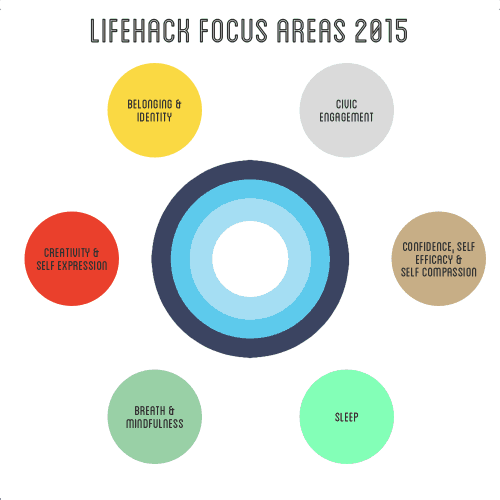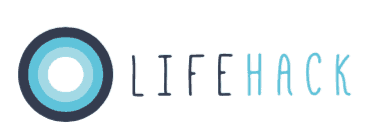Lifehack’s Focus Areas in 2015
Over the course of 2014, Lifehack gained new ground and understanding about the relationship of Wellbeing and Mental Health, and specifically how working proactively on wellbeing, we have the potential to make a difference to people who are struggling with mental health challenges (such as anxiety & depression), whilst also building the resilience of a generation. You can read more about this in our ‘What Is Flourishing?’ section.
We also found that people who came to our events and longer bootcamp experiences were keen to better understand what made up Wellbeing, and how to address specific elements to build projects, ventures and prototype tech which would shift the needle for young people around the country.
After a lot of research, conversations with leading academics, and a dose of crowdsourcing from you (the Lifehack community), we’re proud to announce the key areas we’ll be focusing on in 2015.

Identity and Belonging
Around the country in 2014 we kept saw this coming up – whether it was the SummerzEnd YouthFest in Christchurch, the “You Know You’re A Coaster…” campaign on the West Coast, the South Alive project in Southland, or many of the other projects we met, worked with, and heard about around the country.
Young people are clearly asking the question “Who Am I? And where do I belong?”
For some people and communities, this is a deep cause of anxiety and discomfort. For others, it can be a deep well of power and energy. In 2015 we’ll be looking at how we can help individuals, groups, communities and perhaps even young people around the country, have conversations about their identity and belonging.
Some examples of research linking Identity, Belonging & Wellbeing:
- “Need for belonging, relationship satisfaction, loneliness, and life satisfaction” – 2007 – Mellora, Stokesa, Firthb, Hayashia, Cumminsa
- “The Need To Belong: Desire For Interpersonal Attachments as a Fundamental Human Motivation” – 1995 – Baumeister & Leary
- “A Question Of Belonging” – 2007 – Walton & Cohen
- “The Pacific Identity and Wellbeing Scale (PIWBS): A culturally-appropriate self-report measure for Pacific peoples in New Zealand” – Manuela & Sibley
- “Māori Family Views of Family Wellbeing” – 2014 – Boulton & Gifford
- “Te Māoritanga: wellbeing and identity.” – 2010 – Paenga
Creativity & Self Expression
Another strong topic from 2014 was the role of music and creativity in Aotearoa – whether it was Performing Arts training in Northland, Rangatahi musicians in Southland, or West Coasters wanting to set up a radio station. As Go Flo emerged from Lifehack Labs we encountered some strong research links between creativity, self expression and wellbeing – we’re excited by the possibilities for all young people to engage in this, and for it to be scaled up in impact through technology.
We’re excited to be looking at exploring this area further, seeing what the research tells us, as well as generating some new insights with a specific focus on Aotearoa New Zealand context.
Some examples of research linking Creativity, Self Expression & Wellbeing:
- “Te Māoritanga: wellbeing and identity.” – 2010 – Paenga
- “Ngā Hua a Tāne Rore : The Benefits Of Kapa Haka” – 2014 – Pihama, Tipene, Skipper
- “Hip-Hop State Of Mind” – 2014 – Sulea & Inkster
- “Artistic and Everyday Creativity: An Act-Frequency Approach” – 2011 – Ivcevic
- “The Connection Between Art, Healing, and Public Health” – 2010 – Stuckey & Nobel
Breath & Mindfulness
Overwhelming evidence is pointing to breath and mindfulness as key approaches to a wide range of positive health and societal outcomes.
YOMO is one of the Lifehack Ventures which is taking some of the great content from positive psychology and mindfulness especially, and finding new ways to bring it into people’s lives, as well as looking at how technology may augment our understanding of its impact on our lives.
Some examples of research linking Breath, Mindfulness & Wellbeing:
- “The Benefits Of Being Present : Mindfulness And It’s Role In Psychological Wellbeing” – 2003 – Brown & Ryan
- “Cultivating mindfulness: and it’s effects on well-being” – 2008 – Shapiro, Oman, Thoresen, Plante, Flinders
- “The Effects of a Mindfulness-Based Education Program on Pre- and Early Adolescents’ Well-Being and Social and Emotional Competence” – 2010 – Schonert-Reichl & Stewart Lawlor
- “Nurturing Mindfulness in Children and Youth” – 2012 – Greenberg & Harris
- “Loving-Kindness Meditation Increases Social Connectedness” -2008 – Hutcherson, Seppala & Gross
Sleep
This is a topic which we haven’t yet had much to do with, but we know from a range of studies that it is one of the highest predictors of all kinds of stress, and profoundly affects our biological and neurological processes. It is particularly important in the adolescent 12-24 age range we’re working with as well.
We’re excited to see what we can learn and contribute to the conversation, and see how our community’s creativity may be applied to this important topic.
Some examples of research linking Sleep & Wellbeing:
- “Impact of Delaying School Start Time on Adolescent Sleep, Mood, and Behavior” – 2010 – Owens, Belon & Moss
- “Daily Variation in Adolescents’ Sleep, Activities, and Psychological Well-Being” – 2006 – Fuligni & Hardway
- “Why Is Sleep So Important?” – 2012 – NIH
- “11 Reasons Why Sleep Is So Important” – 2009 – Psychology Today
Confidence, Self Efficacy & Self Compassion
These were areas heavily suggested by our academic friends and a significant amount of research, as well as something a lot of our community appeared to gel with as something to take action on.
There was strong relationships between these elements and the ability to be adaptive and resilient, and we think it has a wide variety of ways the Lifehack Community can take action, with plenty of room for technological innovation as well.
Some examples of research linking Confidence, Self Efficacy, Self Esteem & Wellbeing:
- “Self-efficacy, social support and well-being: The mediating role of optimism” – 2005 – Karademas
- “Grit: The skills for success and how they are grown” – 2009 – Roberts
- “The student well-being model: a conceptual framework for the development of student well-being indicators” – 2012 – Souttera, O’Steena & Gilmore
- “Māori Cultural Efficacy and Subjective Wellbeing: A Psychological Model and Research Agenda”
– 2010 – Houkamau & Sibley - “Looking for adolescents’ well-being: self-efficacy beliefs as determinants of positive thinking and happiness.” – 2006 – Caprara, Steca, Gerbino, Pacielloi & Vecchio
- “Social Connection and Compassion: Important Predictors of Health and Well-Being.” – 2013 – Seppala, Rossomando and Doty
Civic Engagement
We know from a range of research that young people who are engaged in their communities – whether it’s through helping out, volunteering, sports, or more deeply in decision making and political matters – tend to have greater wellbeing.
There’s some world leading research happening in our backyard with the likes of Jill Hayhurst at Otago Uni, and the Design & Democracy Lab at Massey University. We’re excited to see how Lifehack can contribute to supporting some of the projects and research to expand and take flight this year.
Some examples of research linking Civic Engagement & Wellbeing:
- “Civic Engagement and Psychosocial Well-Being in College Students” – 2011 – Flanagan & Bundick
- “The contribution of human and social capital to building community well-being: a research agenda relating to citizen participation in local governance in Australia” – 2003 – Cuthill
- “Travelling Through Social Support and Youth Civic Action on a Journey Towards Resilience” – 2011 – Dolan
- “Youth civic engagement and support: promoting well-being with the assistance of a UNESCO Agenda” – 2010 – McAuley
We’re excited by where this new focus will take us, and invite participation, additional research and partnerships to help us go deeper into the Aotearoa New Zealand context for all of this work.


Hi – love the rigour of this and that you are focusing on the protective factors for mental health. Am so super excited about this.
I am working with a charity called Mothers network (inc) which has been going for over 30 years in Wellington and we are taking a really hard look at our future. I am sharing this as a resource for our facilitators, as well as viewing our organisation as one that helps women with protective factors in positive mental health such as building confidence, and belonging and identity.
Thanks for your note Megan – great to know that the Focus areas are helpful for you!